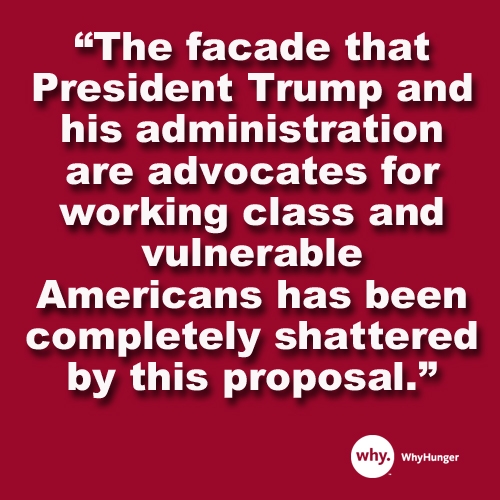The White House announced today that the President’s new budget calls for roughly $2.9 trillion in cuts to essential anti-poverty and nutrition programs over the next 10 years that will directly affect the ability of millions of struggling families, low-income workers, children, elderly and disabled Americans to meet their basic needs of affordable health care, accessible education and basic access to nutritious food.
The Washington Post estimates that cuts in programs like Medicaid and SNAP (Supplemental Nutrition Assistance Program) would directly affect up to one fifth of all Americans. Funding for SNAP, which helps 44 million Americans get the nutritious food they need to live, work and thrive would be cut by more than $193 billion over 10 years, over a 25% reduction. It might be easy for members of Congress or those of us glancing at the evening news to see these big numbers represented in pie charts that promise a balanced budget, and fail to see the 44 million Americans — our neighbors, friends, co-workers and relatives – whose safety net will be severely compromised or eliminated. In fact, the vast majority of SNAP recipients are children, seniors and working families who simply don’t make enough to meet their basic needs. The budget doesn’t stop there, but calls for cuts for college tuition, Medicaid, rental assistance, job training, and income assistance to poor seniors and people with disabilities.
The facade that President Trump and his administration are advocates for working class and vulnerable Americans has been completely shattered by this proposal. The false narrative that these essential programs create “dependency” is not only inaccurate, but its damaging to the millions of folks struggling to make ends meet.
After 42 years of working with community-based organizations across the country and answering countless Hotline calls from families in immediate need of food, we at WhyHunger know that these cuts will have real, lasting effects on some of the most vulnerable and hardworking Americans for this generation and the next.
If this budget were designed to help anyone except the 1%, it would be filled with programs to support living wage jobs, affordable education and healthcare, universal free school meals, and incentives to build local food and farm economies. It would roll back tax breaks and other incentives that lead to greater consolidation of wealth in the food system and a disregard for the stewardship of the natural resources necessary to nourish us all and cool the planet. It would invest in opportunities for all Americans to live healthy, productive and dignified lives and help rebuild communities most affected by hunger and poverty.
We must stand together to demand that our representatives in Congress reject this proposed budget that hurts our most vulnerable communities and further divides our nation. And we must come together to develop and implement a shared road map for a future that protects children and seniors; ensures the dignity and health of workers; and invests directly in communities’ renewal the country over.
We call on you to join WhyHunger in speaking out! Contact your Member of Congress, write a letter to your editor, share your thoughts on social media and talk with your friends and family about the type of budget, and type of world, you want to see.
This post was updated 5.25






